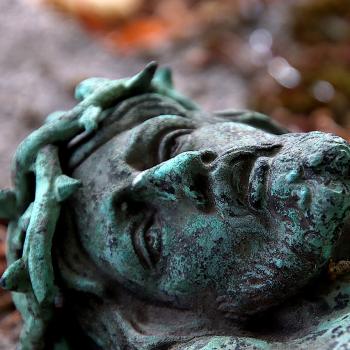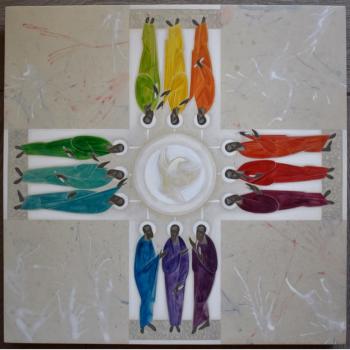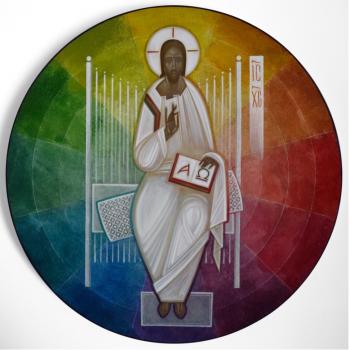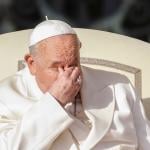 This is the manuscript of a sermon preached at Stone Hill Church in Princeton, NJ. After the sermon, I led the congregation in a time of prayerful reflection of the center panel of Matthias Grünewald’s Isenheim Altarpiece (a cropped version is above).
This is the manuscript of a sermon preached at Stone Hill Church in Princeton, NJ. After the sermon, I led the congregation in a time of prayerful reflection of the center panel of Matthias Grünewald’s Isenheim Altarpiece (a cropped version is above).
If I were brave (and perhaps wild) enough to be a part of that wandering band of men and women that constituted his initial followers, I never would have expected to see Jesus hanging on a cross. And yet… if I imagine myself at the scene of the crime, as an eyewitness to this most famous of executions on that hill outside of Jerusalem, the first three of Jesus’ last words seem to be exactly what I would expect from him:
First, a prayer of forgiveness on behalf of his executioners: “But I say Love your enemies and pray for those who persecute you”); and then a promise of forgiveness leading to Paradise for a criminal: “For I came not to call the righteous, but sinners”); and then providing for Mary, his widowed mother, whom he would no longer be able to care for (“honor your father and mother”).
In the first of his last three words, Jesus is still acting in character.
But as we follow the drama along the lines of the 7 last words of Jesus, things turn a corner with the fourth word, the word Mark just walked us through. After a few hours of brutal torture, Jesus was finally exposed and deserted…and judged. And so he cried out in a loud voice: “My God, My God, why have you forsaken me?”
The whole scene takes a dramatic and devastating turn with the fourth and then the fifth word, which we’ll now consider together.
This is what we read in the Gospel of John:
 “After this, Jesus, knowing that all was now finished, said (to fulfill the Scripture), “I thirst.” A jar full of sour wine stood there, so they put a sponge full of the sour wine on a hyssop branch and held it to his mouth.”
“After this, Jesus, knowing that all was now finished, said (to fulfill the Scripture), “I thirst.” A jar full of sour wine stood there, so they put a sponge full of the sour wine on a hyssop branch and held it to his mouth.”
Jesus’ fifth word, “I thirst” is nothing but the corollary of his being forsaken. “My God, My God, why have you forsaken me?” is the clarion cry of failure. “I thirst” simply confirms that defeat.
With these two words, the mask is removed. Jesus’ true character is revealed… or so it would seem.
Now there is no universal agreement among scholars as to exactly what Old Testament text Jesus’ comment fulfills. Some think this is a reference to Psalm 69 but I will argue that Jesus is fulfilling the 22nd Psalm.
Psalm 22 begins with these words:
1 My God, my God, why have you forsaken me?
Why are you so far from saving me, from the words of my groaning?
2 O my God, I cry by day, but you do not answer,
and by night, but I find no rest.
And continues…
14 I am poured out like water,
and all my bones are out of joint;
my heart is like wax;
it is melted within my breast;
15 my strength is dried up like a potsherd,
and my tongue sticks to my jaws;
you lay me in the dust of death.
“My tongue sticks to my jaws” … “I thirst”
Jesus is the man of Psalm 22. His parched mouth confirms it.
There is no doubt that this thirst is a physical thirst… Jesus is exhausted and parched and how could you not be after all he’s been through? But it’s so much worse than that. His thirst is far deeper – it is a spiritual thirst… an existential thirst.
There is such tragic irony in Jesus’ confession of his own thirst, especially when reading the Gospel of John.
To the woman at the well in John 3 Jesus says: “but whoever drinks of the water that I will give him will never be thirsty again. The water that I will give him will become in him a spring of water welling up to eternal life.” (3:14)
And, later, to the crowds in John 6 he said: “whoever believes in me shall never thirst.” (6:35)
And again in John 7, we read this: “On the last day of the feast, the great day, Jesus stood up and cried out, “If anyone thirsts, let him come to me and drink. 38 Whoever believes in me, as the Scripture has said, ‘Out of his heart will flow rivers of living water.’” (7:37-38)
In this last passage, John is referring to the Feast of Tabernacles, the feast commemorating Israel’s wandering in the desert after the Exodus, a time and place where they knew what it meant to be thirsty. [1] Jesus is claiming in such a scandalous way and at such a provocative time that he could satisfy their thirst.
And yet, there he hangs on the cross saying “I thirst.”
Such tragic, such pitiful irony. The man who claimed to be the wellspring that would and could quench thirst eternally, is now a man who is himself asking for a drink. Jesus’ attempt, at whatever it was people thought he was attempting, had dried up… or so it appeared.
But to quote the simple wisdom of an ancient Roman poet, “things are not always what they seem; first appearances deceive many.” [2]
Indeed, the cross reorients our expectations and the resurrection beckons us to look beyond first appearances… Father Richard John Neuhaus says that it is precisely “In this killing that some call senseless [that] we are brought to our senses.”
The cross is not proof that Jesus is a failure, and a liar, and a soon-to-be-dead man. No, the cross is the means by which he becomes the Way, and the Truth, and the Life.
The cross is not proof that Jesus is not the King but is, in fact, the very means by which He becomes the King. Pilate was a prophet… Only he had no idea how right he was when he wrote, “This is Jesus, King of the Jews.”
The seven last words of Jesus, therefore, constitute King Jesus’ inaugural address on the day of his coronation.
How is this possible? It is possible only through his thirsting. By drinking the cup of God’s wrath to the dregs, Jesus is left forsaken and then judged. In a word – he is left thirsting. It is only through his thirsting, his identifying with our sinfulness, that he is able to overcome our thirst and provide for us living water…
He thirsts an insufferable thirst in order that we might not have to.
In 2 Corinthians, the Apostle Paul puts it this way: “For our sake [God] made him to be sin who knew no sin, so that in him we might become the righteousness of God.” (2Cor 5:21)
Commenting on this amazing idea, Neuhaus sums it up perfectly: “The language [from Paul] is radical: It was not simply that he bore the consequences of sin, but that he was made to be sin. The great reversal reverses all our preconceptions. God must become what we are in order that we might become what God is.” [4]
God thirsts, in order that we might never be thirsty again.
[1] Richard John Neuhaus, Death on a Friday Afternoon, 145.
[2] Phaedrus, Book IV, Fable 2, Ln 5
[3] Neuhaus, 2.
[4] Neuhaus, 30.















